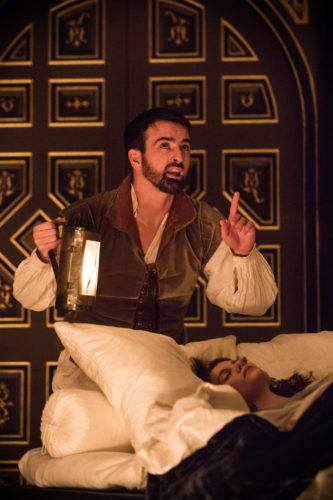Entry and voyeurism both take on a different charge in Shakespeare’s play Cymbeline, as Tarquin resurfaces as a perverse allusion in the chaste British princess Imogen’s (or Innogen’s) bedchamber. Here, Eugene O’Hare as the subtle Italian villain, Iachimo, prowls around the vulnerably sleeping Imogen’s bedroom. He has popped out of a trunk smuggled into her room, and evokes the rapacious stalking of ‘our Tarquin’ – another Italian - as he steps out:
Our Tarquin thus
Did softly press the rushes, ere he waken'd
The chastity he wounded. Cytherea,
How bravely thou becomest thy bed, fresh lily,
And whiter than the sheets! That I might touch!
But the spectre of rape is diverted into a different impulse, and the possibility of ravishment into ravishing depiction:
[…] But my design,
To note the chamber: I will write all down:
Such and such pictures; there the window; such
The adornment of her bed; the arras; figures,
Why, such and such; and the contents o' the story.
Ah, but some natural notes about her body,
Above ten thousand meaner moveables
Would testify, to enrich mine inventory.
(Shakespeare, Cymbeline, 2.2.23-30)
Iachimo sets about taking notes of details of Imogen’s body and her surroundings with the purpose of using them as tokens of false knowledge: supposed proofs which will be artfully narrated to persuade her husband Posthumus of her infidelity and Iachimo’s sexual possession of her. The bed and the bedroom underline the vulnerability of the sleeping woman. The very displacement of the natural sexual intimacy associated with the space into a strange combination of narrative delight and accounting precision seems to define the particular perversity of this invasion.











